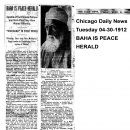Main menu
- ‘Abdu’l-Bahá’s Journey
- World Peace
- Stopping Racism in America
- Empowerment of Women
- More Principles...
- Prayer for America
Bahá is Peace Herald
Apostle of Cult Greets Followers Here After They Have Waited Patiently.
“MARHABA” IS FIRST WORD
“Reality, One and Not Multiple,” Says Leader in Explaining Principles of Belief.
‘Abdu’l-Bahá Abbas, son of Bahá’u’lláh, whose coming was foretold by The Báb in the early days of Bahá’ísm, to-day spoke of newspaper reporters and universal brotherhood and peace in his first Chicago interview. The venerable leader of the Bahá’ís arrived last night from Washington, D.C., after Chicago followers had passed an anxious morning and afternoon meeting inward bound trains and trying to account for his nonarrival. Some ceremony was necessary before a delegation of reporters was ushered into the presence of the son of Bahá’u’lláh.
First, it was necessary to communicate with Ameen Fareed, his nephew and interpreter. A little later word was sent that the delegation would be admitted.
Remains of Frugal Breakfast.
Without the door of the Plaza Hotel suite a dish of radishes and celery, sprinkled with water was discovered. This was part of the breakfast of ‘Abdu’l-Bahá, who has in his company a Persian cook. On the door was a sign, which read:
“Don’t ring the bell. Knock softly.”
One of the delegation knocked softly. Ameen Fareed opened the door and down a long corridor ushered the visitors to the room of “the master.”
“Marhaba!” came a voice from the sunshiny room, speaking the Persian word of welcome.
‘Abdu’l-Bahá looked at each of his visitors intently from under white, bushy eyebrows. His dark skin was interlaced with numberless fine wrinkles. He wore a gray-white beard. His forehead was high and surmounted by a fez turban of fawn and cream color. His rather long gray hair hung in a single curl over the nape of his neck and to his shoulder blades. He wore a fawn colored robe with a cream sash, striped with a simple delicate pink and blue stripe, over which was a black garment. On his feet were congress gaiters.
He motioned his visitors to a seat and sat himself in a rocking chair near the bed. He allowed his glance to roam over the flower decorated room before he spoke through the interpreter.
Reporter Must Purvey Truth.
“A reporter must be a purveyor of truth,” he said in Persian, and Ameen Fareed translated. The newspapers are leaders of the people and the people must be able to rely on what they read. Now, some reporter on a Chicago morning newspaper said that I wore a gown and turban with red and white stripes. I never wore such colors. He said my beard reached to my waist. Look at it.”
The beard, in truth, came scarcely to the chest of ‘Abdu’l-Bahá. As the leader spoke several of his suite peered through the green curtains at the door. “The master” spoke of the teaching of the Bahá’í.
First he spoke of the beginning of the movement in 1884, the coming of the Báb, his martyrdom and the life of exile inflicted on his father, Bahá’u’lláh. He passed over in a sentence his own imprisonment of forty years with his parent in the Turkish penal colony of Akka in Syria, from which he was released with the change in government in 1908.
Summing Up of Teachings.
The interpretation of his summing up of the Bahá’í teachings, in brief, is:
“First, that which concerns the investigation of reality; all prophetic foundations were considered by Bahá’u’lláh to be one in fundamental reality. Reality is one and not multiple, not divisible. His holiness, Abraham, was the herald of reality; his holiness, Moses, was the herald of this reality. His Holiness, Jesus Christ, was the founder of this reality. His Holiness, Bahá’u’lláh, was the light of this reality. Therefore, the reality of all the divine religion is one. The difference is only in imitations.
“The second principle of Bahá’u’lláh is the oneness of humanity. All the people are the servants of God.
Science and Religion Twins.
Thirdly, science and religion are twins. Science is the reality and the religion is the reality. If religion differs from science it is superstition. Fourth, religion must be conducive to the unity of mankind. Fifth, religious prejudice, racial prejudice, patriotic prejudice, the prejudice of interests and political prejudice are the very destroyers of the body politic.
“Sixth, the establishment of a most great peace. Seventh is the equality between man and woman. Woman must be educated and trained in order to reach the status of mind equal to man.”
With a wave of his wrinkled, though powerful looking hand ‘Abdu’l-Bahá tokened an end of the interview. As he said farewell to each of his visitors he presented them with a red apple from a heaped fruit dish. “To-day I shall pass looking about your city,” he said. “It is such a great place. In this country the flag of universal peace must first fly. The American democracy is the one to cope with the problem.”
Poses for Photographer.
A newspaper photographer interrupted the solemn farewell. For him ‘Abdu’l-Bahá changed his dull black outer robe to a lighter, fur lined covering and adjusted his turban in the mirror before posing.
“You said you wished just a minute,” he smiled, after the camera had clicked some half a dozen times. You have taken several. Very good, very good.”
Then, with another shake all around the farewell was said. Out in the first room of the suite a crowd of Chicago Bahá’ís were waiting to gaze upon ‘Abdu’l-Bahá.
[picture caption: ‘ABDU’L-BAHA. (“Servant of the Ineffable Splendor.” Bahá’í leader, who is in Chicago.) Photo by staff photographer of The Daily News.]









